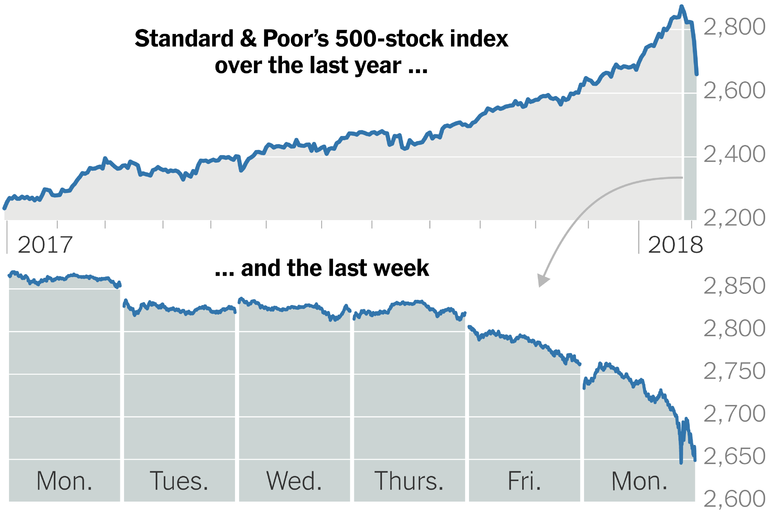Today I spoke with several clients and friends and most of them lost money in the market...again. So how do you stay north when the market goes south? You’ve heard the expression your whole life, but what does it mean when it applies to your finances? Well to begin with, it’s not good.
Here’s the definition from Dictionary.com:1
go south
verb phrase
to fall or slide down; to decline; to fall in value
Examples
His golf game is going south.
Usage Note
slang; goes south, going south, went south, gone south
The recent stock market downward corrections in 2018 have millions of active and passive investors nervous… again.

Many experts agree that the nine-year bull market is feeling the giant paws of the bear market clawing into their financial breadbasket.
I concur and believe this is only the beginning. To take you back a bit (6 months), here are a few headlines to consider taken directly from Google on Saturday March 24, 2018.2
"What was once considered an anomaly now seems to be a trend".
My personal favorite is the last one stating “Losses are part of the game when investing in the stock market”. Maybe it’s just me, but I've always thought keeping my money is always better than losing it.

Dow closes at 2018 low as trade worries rise - MarketWatch
https://www.marketwatch.com › Markets › U.S. & Canada › Market Snapshot
1 day ago - The benchmark index lost 6% over the week and is down 3.2% year to date. The Nasdaq Composite Index COMP, -2.43% declined 174.01 points, or 2.4%, to 6,992.67 and posted a 6.5% loss over the week. Weekly losses for all three benchmarks were the steepest since January 2016, when markets were ...
Dow drops more than 400 points into correction, posts worst week ...
https://www.cnbc.com/2018/.../us-stock-markets-set-for-a-sharp-fall-at-the-open-amid...
2 days ago - The major averages posted their biggest weekly loss since January 2016. The Dow and S&P 500 dropped 5.7 percent and 5.9 percent this week, respectively, while the Nasdaq pulled back 6.5 percent. "The market has been priced for perfection ... and that leaves the market vulnerable to surprises. In this ...
MARKET SNAPSHOT: Dow Closes At 2018 Low As Trade Worries Rise
news.morningstar.com/...markets/2018032310549/market-snapshot-dow-closes-at-20...
2 days ago - The major averages posted their biggest weekly loss since January 2016. The Dow and S&P 500 dropped 5.7 percent and 5.9 percent this week, respectively, while the Nasdaq pulled back 6.5 percent. "The market has been priced for perfection ... and that leaves the market vulnerable to surprises. In this ...
Dow Jones and S.&P. Slide Again, Dropping by More Than 4% - The ...
https://www.nytimes.com/2018/02/05/business/stocks-equities-dow-markets.html
Feb 5, 2018 - The rule book is now changing, a shift that is sending tremors through the financial markets. The Standard & Poor's 500-stock index fell by more than 4 percent on Monday, deepening its losses from the previous week and erasing its gains for the year. The Dow Jones industrial average sank by 4.6 percent.
Stocks close down, making February the worst month in two years for ...
www.latimes.com/business/la-fi-financial-markets-20180228-story.html
Feb 28, 2018 - Some of Wednesday's drop was due to a slide in the price of oil, which sent energy stocks to the market's sharpest losses. The S&P 500 ... He told Congress that he's more optimistic about the economy, which led some investors to anticipate four rate increases for 2018, up from three last year. Among the ...
This Year's Stock Market Losses Are Normal
awealthofcommonsense.com/2018/03/this-years-stock-market-losses-are-normal/
This Year's Stock Market Losses Are Normal. Posted March 20, 2018 by Ben Carlson. The recent market correction was unusual in how swift it occurred but the magnitude of the losses shouldn't be unexpected for investors. Losses are part of the game when investing in the stock market. This piece I wrote for Bloomberg in ...
SCREEN SHARE
Here’s a picture I took on my iPhone, October 26, 2018. This graph clearly illustrates the current market conditions.

So how does one stay north when the market goes south?

One solution I can share.
The clients that I have helped with this dilemma have not been concerned from this down turn because they made decisions and acted to protect themselves from market losses. How? Because they re-allocated only what was needed to cover the income gap for projected essential expenses (after focused discussions and strategy sessions) into…
You guessed it, the annuity. That awful, beat up, misunderstood and bullied financial instrument that falls into the monetary hierarchy between savings accounts / Cd’s and the stock market.
Let me first say, annuities are not for everyone and I do not consider annuities to be an investment in a portfolio. After all it is an insurance product and should not be considered anything else. However, when they are positioned to provide stability, protection against loss of principle and reduction of risk in a financial plan, they are unmatched by any other financial instrument.
Robert Ibbotson, a renowned financial expert agrees. Ibbotson is a 10-time recipient of Graham & Dodd Awards for financial research excellence and a professor emeritus at the Yale School of Management. Today, Ibbotson's latest research validates that uncapped FIAs (Fixed Indexed Annuities) help control equity market risk, mitigate longevity risk, and have the strong potential to outperform bonds in the very near future.
Suze Orman, an internationally acclaimed personal finance expert has been recommending indexed annuities to shield your retirement nest egg from market volatility for some time. In her NY Times best selling book, “The Road to Wealth,” Suze Orman tells readers that “if you don’t want to take risk but still want to play the stock market, a good index annuity might be right for you.”
True, the circumstances of an individual’s life, goals and retirement needs to be identified, discussed and put in order first before even considering an annuity. Before making a judgement call on whether an annuity should be included in your planning process, I always recommend a little education first. To learn more about annuity basics, read this article on my website: What is an Annuity?
This article is not intended to give you all the details, stats, pros and cons of annuities. Its purpose is simply to illustrate a way to help you keep the money you’ve earned and serve as an alternative to gambling away any portion of your nest egg benchmarked for your essential spending. Depending on your needs, availability of assets and financial goals, annuities if utilized and set up correctly, can provide a guaranteed solution for predictable income that you can’t outlive.

Most people like receiving social security checks and funds received from pensions but rarely think about or acknowledge the fact that they are annuities.
A final note: As with any bull run, your investments are at an all-time high in gross value (minus the recent decline of market value) which translates into higher purchasing power. If in December 2017 you re-allocated of a portion of your IRA, 401k, 403b and or brokerage account into a tax-deferred annuity, it would have would have bought you more then it will today.

How much longer will you wait to consider these benefits? When you lose another 4%, 6%, 10%? Something to ponder.
Now you know there is a way… to stay north when the market heads south.
As always, plan wisely my friends...

Finding a reputable and trusted partner to assist you with your financial & insurance needs is of vital importance. I will work hard to find the best programs, coverage and rates that fits your budget and your needs. Contact me at 949-216-8459 or ccolley@coliday.com
Other articles about Annuities:
What Are Annuities?
Alternatives to Low Paying Bank CD’s
Information and materials are provided for general information and educational purposes based upon publicly available information from sources believed to be reliable—we cannot assure the accuracy or completeness of these materials. The information in these materials may change at any time and without notice. The above information is not intended to provide, and should not be relied on for, tax, legal, accounting or investment advice.
Coliday / Craig Colley is not giving any financial advice, is not a financial advisor and is not affiliated, employed or endorsed by the SSA, Medicare.gov. or any other government agency.
1) http://www.dictionary.com/browse/go-south 2)https://www.google.com/searchq=how+to+stay+north+when+the+market+goes+south&oq=how+to+stay+north+when+the+market+goes+south&aqs=chrome..69i57.47458j0j7&sourceid=chrome&ie=UTF-8 3)graph https://www.nytimes.com/2018/02/05/business/stocks-equities-dow-markets.html
